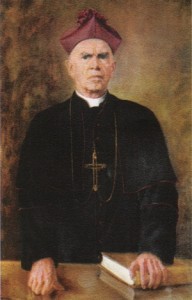Our organizer
About Bishop Hodur
Bishop Hodur was, is, and always will be remembered as the organizer and leader of a new religious movement among the Polish people who believed that God created the people for good, happiness and salvation and not for punishment, exploitation and abuse.

Bishop Francis Hodur
His Early Life
• Francis Hodur was born near Krakow, Poland. One of seven children in a poor family.
• While preparing for the priesthood at the Jagiellonian University, he was an exceptional student.
• He emigrated to the U.S. in 1893. That same year, he was ordained as a priest.
• On the 14th of March 1897, Father Hodur became pastor of St. Stanislaus Cathedral, Scranton, PA.
• On Sept 29, 1907, Father Hodur was consecrated bishop by Old Catholic Bishops in Utrecht, Holland.
His Beliefs
• Bishop Hodur was devoted to Catholic Christianity, and believed that Christ’s ideals should be lived by everyone. He sought to promote the human dignity of the Polish people.
• Love for the Polish people led him to encourage their unity in God and loyalty to America while maintaining deep respect for Poland.
Accomplishments as Church Leader
• Composed the “Confession of Faith” and “The Eleven Great Principles”
Published the first church newspaper, Straz, in 1897.
• Organized Church Societies to encourage and support the men, women and youth of the Church.
• Helped to organize a large number of parishes throughout the United States.
• Visited Poland 18 times to teach the beliefs of the Polish National Catholic Church.
• Organized the Polish National Union, Spojnia (A Christian Fraternal Organization).
• Created a home for the aged and a camp for the children and youth.
• Published the current Church newspaper, “God’s Field” (Rola Boza), in 1923.
Bishop Francis Hodur
The Bishop Hodur History and Archives Commission
2002 – The 105th Anniversary of the PNCC and 95th Anniversary of Bishop Hodur’s Consecration
Text from 2002 Prime Bishop Franciszek Hodur Pamphlet
This year we commemorate the centennial of Bishop Franciszek Hodur’s ordination to the Holy Priesthood.
Therefore, the Board of the United Maria Konopnicka Societies of the Polish National Catholic Church of America resolved to observe this anniversary with the publication of a short, biographical sketch of this man of God who was the Founder of our society.
We dedicate this pamphlet to the memory of this great Son of the Polish Nation, a humble priest and a loyal servant of God and His people.
On Easter Sunday, April 1, 1866, a son was born to Jan and Maria Hodur in the little village of Zarki, in the country of Chrzanow, about 35 miles from Krakow in the Austrian-ruled part of Poland which was sometimes called Galicja. He was given the name Franciszek (Francis). The Hodurs were simple, hardworking, religious people who, with their seven children, eked out a living on their far and through part-time labor (Jan was also a tailor). After a late start in his primary school education, Franciszek immediately showed scholarly promise and completed his high school education with honors on a scholarship at the prestigious St. Anne’s Gymnasium in Krakow, in 1889. After a brief hiatus in theatrical work, he enrolled as a seminary student in Krakow where he was able to take most of his course work at the renowned Jagiellonian University.
As a high school student and seminarian, Franciszek not only excelled in his academic work but also showed much concern for his people, especially the down-trodden and exploited peasants. His extensive readings ranged from the newly-issued social encyclical Reum Novarum of Pope Leo XIII to some of the socialist thinkers. An ardent follower of the activist Father Stanislaw Stojalowski, Seminarian Hodur was involved in a student group espousing Stojalowski’s program for peasant rights, education, and economic improvement.
In 1892, Franciszek Hodur, then with minor clerical orders, participated in a seminary “strike” for better living conditions. His role in this “insubordination,” noted by his authorities, meant a very uncertain future for him. Leaving Europe on the last day of the year, he embarked for the United States with the hope of a new beginning as a pastor to Polish immigrants.
Upon landing in New York, Seminarian Hodur “advertised” himself in a newspaper letter. He came to the attention of Father Benvenuto Gramplewicz of Nanticoke, Pennsylvania, who brought him to the Scranton Diocese where there was a shortage of Polish-speaking clergy. He was then sent to the Seminary at St. Vincent’s Benedictine Archabbey in Latrobe (known as Beatty) in the Pittsburgh area. After several months of additional studies (lectures were given to classes of immigrant students in Latin) he was returned to Scranton. He received his major orders in one week and was ordained to the priesthood by Bishop William O’Hara on Saturday, August 19, 1893.
Father Hodur’s first assignment was the ethnically Polish Sacred Heart of Jesus and Mary Parish on Scranton’s South Side. As assistant, he distinguished himself not only as a religiously zealous priest, but he also involved parishioners in such activities as Polish patriotic programs, plays, and a parish library. He even edited a newspaper.
In 1895, Father Hodur was assigned as pastor to Holy Trinity Parish in Nanticoke, Pennsylvania.
